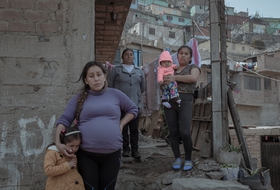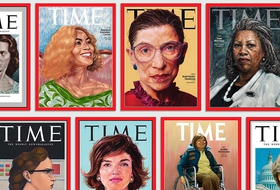
One in three women have suffered physical or sexual violence. With contributions from Europe, Africa, Asia and Latin America, we look at how this shadow pandemic affects every corner of the world.
Born in Ivrea, northern Italy, Paola Gianotti is a world citizen. This is the most suitable definition for this woman, who, after obtaining a degree in economics and working a few years in a communications company, dropped everything to travel around the world by bike. This was her dream and she managed to realise it:
Born in Ivrea, northern Italy, Paola Gianotti is a world citizen. This is the most suitable definition for this woman, who, after obtaining a degree in economics and working a few years in a communications company, dropped everything to travel around the world by bike. This was her dream and she managed to realise it: she set a Guinness World record, cycling for 30,000 kilometres in just 144 days. And that’s not all. A few months later she mounted on her bike and was the only woman to compete in the 2015 Red Bull Trans-Siberian Extreme race, along with her friend Paolo Aste. They ranked third. She wrote, printed and promoted her book Sognando l’infinito (Dreaming the infinite) and soon found a new challenge: cycling from Milan to Oslo to deliver a petition signed by more than 10,000 people with the aim in mind to present the bicycle as a candidate for the Nobel Peace Prize. Now, Paola, who took up so many unforgettable challenges, is training for a new venture to set a new world record as well as reach a major goal: crossing 48 US States in 48 days and donate 48 bikes to the same number of Ugandan women through an online fundraising campaign. About a month before Paola will start her journey (27 April), she told us what she thinks about women now that she’s travelled in many places around the world. And what’s her hope for all the women around the world for 8 March.
Have you ever met other women riding bikes or these are means of transport mainly used by men?
I’ve met other women riding bikes. In Australia and the United States many women use this vehicle for exercise or sport, while in Europe bicycling is typically a male sport. In the Asian countries it is mostly employed by women, who have to reach markets and get around.
With your new challenge, 48 States – 48 days – 48 bikes, you aim to make a donation to Ugandan women. How did this idea originate?
The idea of the 48 states, 48 days, 48 bikes project originates from the fact that I wanted to combine a new big sport adventure with a social initiative. I thought to use the fame I achieved to help Ugandan women. This is the reason why I decided to include in my project donations as well as a fund-raising initiative to buy 48 bicycles. And this is also the reason why I’ll try to set another Guinness World Record by cycling across 48 US States in 48 days for about 12,000 kilometres with 50,000 metres of elevation gain. I liked the idea of going back to the United States, perhaps also because I’ve a score to settle there after the accident I had (during the previous world tour – editor’s note) and I want to return to the US to see what will happen and to forget that something bad happened to me there in the past… On the one hand, I have this unpleasant memory, but on the other, I enjoyed so much the places where I’ve been in the US.
Why did you decide to involve women? And how can people contribute to buy bicycles?
This project involves women because of course I’m a woman and I think that less wealthy countries such as Africa need help and women need more respect than they have. This is why I decided to involve them. People can buy the bicycles on my website keepbrave.com or paolagianotti.com by clicking in the section “challenges”, where it is possible to buy the equivalent of half a bike for 60 euros or an entire bike for 120 euros. Then I will send a thank-you bandana to those who bought half a bike and a keep brave T-shirt or my book Sognando l’infinito to those who bought an entire bicycle. 13 and a half bikes have been bought so far in 4 days of donation and I’m glad because I’ve successfully raised awareness on the issue.
What’s the meaning of 8 March in 2016 in your opinion?
I think that it’s important to celebrate 8 March but I also think that it’s fundamental to stand up for our rights every day of the year to achieve gender equality, empower all women and recognise what women need.
What is the most compelling thing that women have to conquer in your opinion?
I’ve two different opinions: from one hand, in less developed countries there are many things that women have to conquer; the Muslim and African countries, for example, adopt some practices that we all are aware of and that seem unconceivable for us. In these cases, women have a lot to achieve. Probably, this situation goes hand in hand with the country’s cultural condition, and women have to win many freedoms for themselves and fight for their rights. In Western countries the situation is slightly different because women have power but should still be empowered in some fields such as work: women and men are rarely considered in the same way in a company. I must admit, though, that I don’t always agree with women because I think that they often have a victim complex and aren’t self-confident. There are women that don’t do things because they hide behind the fact that they don’t know how to do them and that they’re weaker than men. This excuse bothers me. Obviously I’m talking about Western countries. This is not true for all women, but, in my opinion, many women behave like this.
What’s your hope for all women?
I hope that women living in less developed countries manage to fight until they gain their rights. As regard the rest of the world, I hope that women don’t stop thinking that they’re equal to men, can reach the same goals as men and make the same dreams come true.
Siamo anche su WhatsApp. Segui il canale ufficiale LifeGate per restare aggiornata, aggiornato sulle ultime notizie e sulle nostre attività.
![]()
Quest'opera è distribuita con Licenza Creative Commons Attribuzione - Non commerciale - Non opere derivate 4.0 Internazionale.
One in three women have suffered physical or sexual violence. With contributions from Europe, Africa, Asia and Latin America, we look at how this shadow pandemic affects every corner of the world.
The Istanbul Convention against gender-based and domestic violence marks its tenth anniversary. We look at what it is, who its signatories are, and what the future might hold.
European Commission President Ursula von der Leyen reminded us of the gravity of violence against women around the world, and of the Istanbul Convention’s utmost importance.
President Erdoğan has pulled Turkey out of the Istanbul Convention, key in the fight against gender violence, claiming that it favours the LGBT community rather than family values.
Violence against women in Peru has increased as a result of Covid-19 lockdowns. 14,912 people were reported missing from January to November 2020, more than half of them minors and 64 per cent women. People have been confined to their homes for months, many forced to endure poor physical, economic and social conditions. A situation that
Joys Estefani Qqueccaño Huamani, 24, disappeared from her rural community in Peru on 9 October. Her family began looking for her independently of the authorities and despite the resistance of relatives of Joys Estefani’s ex-partner Arturo Ccana Condori, 32, charged with committing violence against her on 28 September, eleven days before Joys Estefani disappeared. Photos
Costa Rica celebrated its first same-sex marriage when two women, Alexandra Quiros and Dunia Araya, celebrated their wedding: an “extraordinary moment”.
The pandemic and its restrictions are affecting everyone, without exceptions. However factors like housing, income inequalities, gender, access to technology and working conditions are influencing how people experience the health crisis.
Time magazine’s 100 Women of the Year project sheds light on influential women’s stories, from Amelia Earhart to Greta Thunberg. A selection of some of the greats for International Women’s Day.







